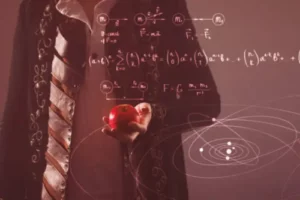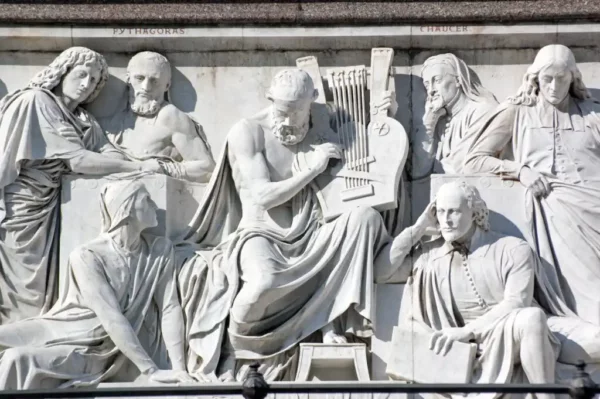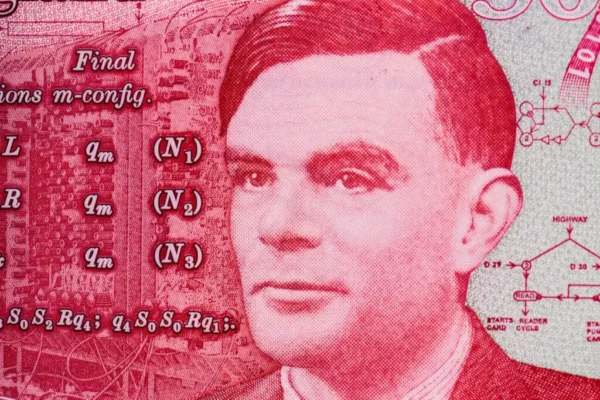20 Mathematicians Who Made History


Reviewed and approved by the psychologist Gema Sánchez Cuevas
Mathematics has been around for a long time. Although India is often cited as its birthplace, in reality, older civilizations had already made enormous progress in this field. In fact, there’s evidence of mathematical concepts and ideas going back at least 20,000 years. Today, we’re going to give you a list of mathematicians who made history for their achievements.
There are actually hundreds of illustrious figures who deserve a place in the history of mathematical thought. However, our list is rather more modest, and we’ve had to leave out some important names.
The best mathematicians in history
Some names in the history of mathematics are part of popular culture. Newton is perhaps the best example. Indeed, he’s a household name even among those who are unaware of his achievements. Here’s our list of 20 of the best mathematicians in history accompanied by a brief review of each of their achievements.
1. Pythagoras (570-495 BC)
Pythagoras is credited with multiple mathematical discoveries, including the Pythagorean Theorem and the Theorem of Proportions, still valid today. He’s said to have been one of the leading thinkers and philosophers or lovers of wisdom. Pythagoras, along with his followers, believed that the Universe could be explained on the basis of numbers.

2. Euclid (325-265 BC)
Euclid is known as the father of geometry. His ideas were collated in his work, Elements, in which there are also other contributions such as the theory of numbers, Euclid’s lemma, Euclid’s algorithm, and the infinity of prime numbers, among others. His work was used as the basis for the regular teaching of mathematics until the beginning of the 20th century.
3. Hypatia (360-415 AD)
Hypatia was one of the most important illustrious thinkers in history. Her life is extremely well documented. Although there’s no evidence that she made any groundbreaking mathematical discoveries, she was a great connoisseur, teacher, and commentator on mathematical works and theorems. She also edited and commented on books by Ptolemy and Apollonius of Perga.
4. Girolamo Cardano (1501-1576)
Girolamo Cardano was probably the most important mathematician of the entire Renaissance. He was the introducer of the binomial theorem and binomial coefficients, as well as one of the founders of the theory of probability. Furthermore, he recognized the existence of imaginary numbers and made contributions to cubic and quartic equations.
5. Isaac Newton (1642-1726)
Isaac Newton was a thinker who needs no further introduction. His work, the Principia, marked a milestone in the history of Western mathematics and physics and formed the basis for classical mechanics. Among many other achievements, he generalized the binomial theorem, developed a method for approximating roots of a function, classified plane cubic curves, and developed infinitesimal calculus.
6. Gottfried Leibniz (1646-1716)
As we mentioned above, Newton was the inventor of infinitesimal calculus. However, Leibniz also shares the credit due to his contributions to the theory. He was a brilliant mathematician, although his ideas were always overshadowed by those of Newton. He anticipated central ideas of modern probability theory and computer science. His contributions were also recognized in geometry, linear functions, calculus, and functions.
7. Thomas Bayes (1702-1761)
Bayes was mainly famous for devising Bayes’ theorem. His ideas on the matter weren’t published during his lifetime, but after his death by Richard Price. Bayesian probability is named after him as well as Bayesian statistics. In fact, he was one of the most important mathematicians in history.
8. Leonhard Euler (1707-1783)
Euler was one of the fathers of infinitesimal calculus, complex analysis, and analytic number theory. He introduced the notion of a mathematical function and of the Euler number. Furthermore, he was the first practitioner of graph theory and gained popularity at the time for solving the Basel problem.
9. Joseph Lagrange (1736-1813)
Lagrange made contributions regarding the analysis of numbers, number theory, and Newton’s classical mechanics. He was also considered to be a promoter of mathematical physics, algebra, analytical geometry, differential equations, and continued fractions. The ideas that reformulate Newton’s theory are known today as Lagrangian mechanics.
10. Pierre-Simon Laplace (1749-1827)
Laplace was a promoter of mathematical physics who made extensive contributions to classical mechanics (especially in relation to calculus). He developed the nebular hypothesis and formulated Laplace’s equation and the Laplacian differential operator. He was probably the best mathematician of his time, so much so that he became known as the French Newton.
11. William Playfair (1759-1823)
Playfair was the founder of the graphical methods of statistics. He invented several types of charts, including line, bar, area, and pie charts. He also made important contributions to economics and engineering. In addition, he wrote several essays on linear arithmetic applied to the progress of commerce.
12. Carl Gauss (1777-1855)
Gauss formulated the fundamental theorem of algebra. He also contributed to the number theorem, arithmetic, quadratic forms, and many other fields. Moreover, he proved and analyzed existing theorems. In fact, thanks to his ideas, they became the norm in mathematics. The Gaussian function and the Gaussian bell were named in his honor.
13. Charles Babbage (1791-1871)
Babbage was credited with inventing the first mechanical computer, which served as the basis for the machines we recognize today. He was one of the founding fathers of the Analytical Society, an institution aimed at introducing the advances of the European continent to the field of English mathematics. He was also credited with creating the first computer program.
14. Ada Lovelace (1815-1852)
Ada Lovelace continued and expanded on the works of Babbage and made unique contributions to the history of mathematics. She created the first algorithm designed specifically for use on a computer. For this reason, she’s often cited as the first female programmer in history. Her work has gained great interest in recent years.
15. James Maxwell (1831-1879)
Maxwell is known for his contributions to the classical theory of electromagnetic radiation. This was the first theory in history to describe light, magnetism, and electricity. His ideas were considered to be the second great unification of physics. He also developed a statistical model to explain the kinetic theory of gases.
16. David Hilbert (1862-1943)
Hilbert’s contributions are so extensive that they can’t be cited in one paragraph. In fact, he’s considered to be the most important mathematician of the late 19th and early 20th centuries. He discovered fundamental ideas of the foundations of geometry, the algebraic theory of numbers, commutative algebra, the theory of invariants, and the calculus of variations.
17. Srinivasa Ramanujan (1887-1920)
Although Ramanujan’s contributions were obscured for several decades, he certainly deserves a place on our list of mathematicians who made history. He was mainly self-taught and was considered to be a genius like no other in his time. He made contributions to mathematical analysis, infinite series, continued fractions, and number theory.
18. John von Neumann (1903-1957)
John von Neumann was considered to be the most important mathematician of his time. He made contributions to functional analysis, representation theory, numerical analysis, topology, geometry, algebra, ergodic theory, and group theory. He also contributed to physics, computing, statistics, and economics.
19. Stanisław Ulam (1909-1984)
Ulam went down in history for participating along with a dozen scientists in the Manhattan Project. Among other things, he discovered the concept of the cellular automaton, a computational model in use today. He contributed to both pure and applied mathematics, as well as proposing theorems and conjectures.

20. Alan Turing (1912-1954)
Turing was one of the founding fathers of theoretical computer science, where he made contributions to algorithms, computing, and artificial intelligence. He also made fundamental contributions to cryptanalysis, which he developed in a practical way during World War II. The interest in his contributions is relatively recent.
Finally, as we mentioned earlier, our list of mathematicians who made history is far too short, as there have been hundreds of mathematicians who have made essential contributions to the history of mathematics. However, their legacy lives on in many different objects and innovations we enjoy today.
Mathematics has been around for a long time. Although India is often cited as its birthplace, in reality, older civilizations had already made enormous progress in this field. In fact, there’s evidence of mathematical concepts and ideas going back at least 20,000 years. Today, we’re going to give you a list of mathematicians who made history for their achievements.
There are actually hundreds of illustrious figures who deserve a place in the history of mathematical thought. However, our list is rather more modest, and we’ve had to leave out some important names.
The best mathematicians in history
Some names in the history of mathematics are part of popular culture. Newton is perhaps the best example. Indeed, he’s a household name even among those who are unaware of his achievements. Here’s our list of 20 of the best mathematicians in history accompanied by a brief review of each of their achievements.
1. Pythagoras (570-495 BC)
Pythagoras is credited with multiple mathematical discoveries, including the Pythagorean Theorem and the Theorem of Proportions, still valid today. He’s said to have been one of the leading thinkers and philosophers or lovers of wisdom. Pythagoras, along with his followers, believed that the Universe could be explained on the basis of numbers.

2. Euclid (325-265 BC)
Euclid is known as the father of geometry. His ideas were collated in his work, Elements, in which there are also other contributions such as the theory of numbers, Euclid’s lemma, Euclid’s algorithm, and the infinity of prime numbers, among others. His work was used as the basis for the regular teaching of mathematics until the beginning of the 20th century.
3. Hypatia (360-415 AD)
Hypatia was one of the most important illustrious thinkers in history. Her life is extremely well documented. Although there’s no evidence that she made any groundbreaking mathematical discoveries, she was a great connoisseur, teacher, and commentator on mathematical works and theorems. She also edited and commented on books by Ptolemy and Apollonius of Perga.
4. Girolamo Cardano (1501-1576)
Girolamo Cardano was probably the most important mathematician of the entire Renaissance. He was the introducer of the binomial theorem and binomial coefficients, as well as one of the founders of the theory of probability. Furthermore, he recognized the existence of imaginary numbers and made contributions to cubic and quartic equations.
5. Isaac Newton (1642-1726)
Isaac Newton was a thinker who needs no further introduction. His work, the Principia, marked a milestone in the history of Western mathematics and physics and formed the basis for classical mechanics. Among many other achievements, he generalized the binomial theorem, developed a method for approximating roots of a function, classified plane cubic curves, and developed infinitesimal calculus.
6. Gottfried Leibniz (1646-1716)
As we mentioned above, Newton was the inventor of infinitesimal calculus. However, Leibniz also shares the credit due to his contributions to the theory. He was a brilliant mathematician, although his ideas were always overshadowed by those of Newton. He anticipated central ideas of modern probability theory and computer science. His contributions were also recognized in geometry, linear functions, calculus, and functions.
7. Thomas Bayes (1702-1761)
Bayes was mainly famous for devising Bayes’ theorem. His ideas on the matter weren’t published during his lifetime, but after his death by Richard Price. Bayesian probability is named after him as well as Bayesian statistics. In fact, he was one of the most important mathematicians in history.
8. Leonhard Euler (1707-1783)
Euler was one of the fathers of infinitesimal calculus, complex analysis, and analytic number theory. He introduced the notion of a mathematical function and of the Euler number. Furthermore, he was the first practitioner of graph theory and gained popularity at the time for solving the Basel problem.
9. Joseph Lagrange (1736-1813)
Lagrange made contributions regarding the analysis of numbers, number theory, and Newton’s classical mechanics. He was also considered to be a promoter of mathematical physics, algebra, analytical geometry, differential equations, and continued fractions. The ideas that reformulate Newton’s theory are known today as Lagrangian mechanics.
10. Pierre-Simon Laplace (1749-1827)
Laplace was a promoter of mathematical physics who made extensive contributions to classical mechanics (especially in relation to calculus). He developed the nebular hypothesis and formulated Laplace’s equation and the Laplacian differential operator. He was probably the best mathematician of his time, so much so that he became known as the French Newton.
11. William Playfair (1759-1823)
Playfair was the founder of the graphical methods of statistics. He invented several types of charts, including line, bar, area, and pie charts. He also made important contributions to economics and engineering. In addition, he wrote several essays on linear arithmetic applied to the progress of commerce.
12. Carl Gauss (1777-1855)
Gauss formulated the fundamental theorem of algebra. He also contributed to the number theorem, arithmetic, quadratic forms, and many other fields. Moreover, he proved and analyzed existing theorems. In fact, thanks to his ideas, they became the norm in mathematics. The Gaussian function and the Gaussian bell were named in his honor.
13. Charles Babbage (1791-1871)
Babbage was credited with inventing the first mechanical computer, which served as the basis for the machines we recognize today. He was one of the founding fathers of the Analytical Society, an institution aimed at introducing the advances of the European continent to the field of English mathematics. He was also credited with creating the first computer program.
14. Ada Lovelace (1815-1852)
Ada Lovelace continued and expanded on the works of Babbage and made unique contributions to the history of mathematics. She created the first algorithm designed specifically for use on a computer. For this reason, she’s often cited as the first female programmer in history. Her work has gained great interest in recent years.
15. James Maxwell (1831-1879)
Maxwell is known for his contributions to the classical theory of electromagnetic radiation. This was the first theory in history to describe light, magnetism, and electricity. His ideas were considered to be the second great unification of physics. He also developed a statistical model to explain the kinetic theory of gases.
16. David Hilbert (1862-1943)
Hilbert’s contributions are so extensive that they can’t be cited in one paragraph. In fact, he’s considered to be the most important mathematician of the late 19th and early 20th centuries. He discovered fundamental ideas of the foundations of geometry, the algebraic theory of numbers, commutative algebra, the theory of invariants, and the calculus of variations.
17. Srinivasa Ramanujan (1887-1920)
Although Ramanujan’s contributions were obscured for several decades, he certainly deserves a place on our list of mathematicians who made history. He was mainly self-taught and was considered to be a genius like no other in his time. He made contributions to mathematical analysis, infinite series, continued fractions, and number theory.
18. John von Neumann (1903-1957)
John von Neumann was considered to be the most important mathematician of his time. He made contributions to functional analysis, representation theory, numerical analysis, topology, geometry, algebra, ergodic theory, and group theory. He also contributed to physics, computing, statistics, and economics.
19. Stanisław Ulam (1909-1984)
Ulam went down in history for participating along with a dozen scientists in the Manhattan Project. Among other things, he discovered the concept of the cellular automaton, a computational model in use today. He contributed to both pure and applied mathematics, as well as proposing theorems and conjectures.

20. Alan Turing (1912-1954)
Turing was one of the founding fathers of theoretical computer science, where he made contributions to algorithms, computing, and artificial intelligence. He also made fundamental contributions to cryptanalysis, which he developed in a practical way during World War II. The interest in his contributions is relatively recent.
Finally, as we mentioned earlier, our list of mathematicians who made history is far too short, as there have been hundreds of mathematicians who have made essential contributions to the history of mathematics. However, their legacy lives on in many different objects and innovations we enjoy today.
All cited sources were thoroughly reviewed by our team to ensure their quality, reliability, currency, and validity. The bibliography of this article was considered reliable and of academic or scientific accuracy.
- Alonso, D., & Tubau, E. (2002). Inferencias bayesianas: una revisión teórica. Anuario de Psicología, 33(1), 25-47.
- Anacona, M. (2003). La historia de las matemáticas en la educación matemática. Revista Ema, 8(1), 30-46.
- Ávila, G. (2001). Euclides, geometria e fundamentos. Revista do professor de matemática, 45.
- Hodges, A. (2002). Alan Turing.
- Newton, I., & Whiteside, D. T. (2008). The mathematical papers of Isaac Newton. The Mathematical Papers of Isaac Newton.
- Zúñiga, Á. R. (2003). Historia y filosofia de las matemáticas. EUNED.
This text is provided for informational purposes only and does not replace consultation with a professional. If in doubt, consult your specialist.







